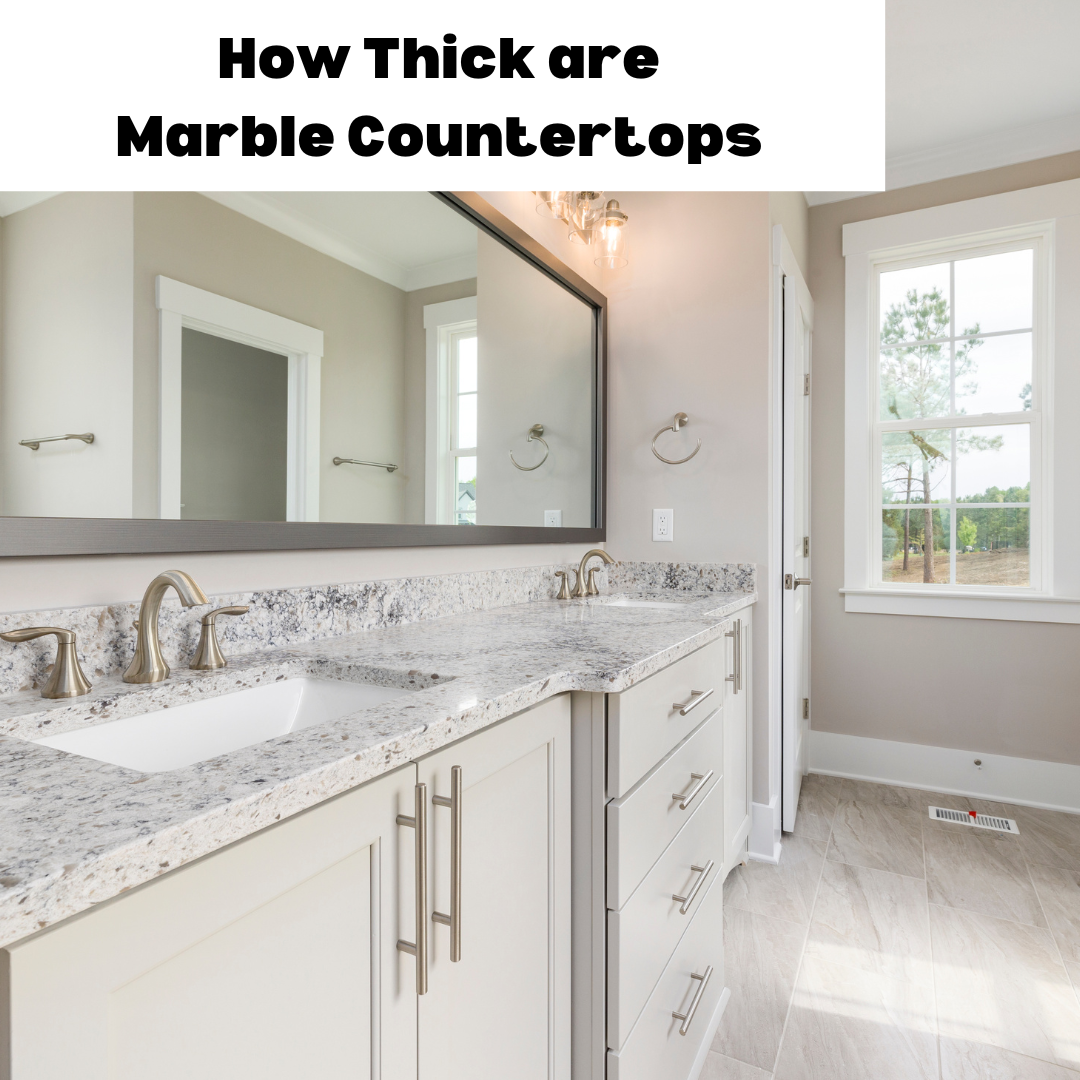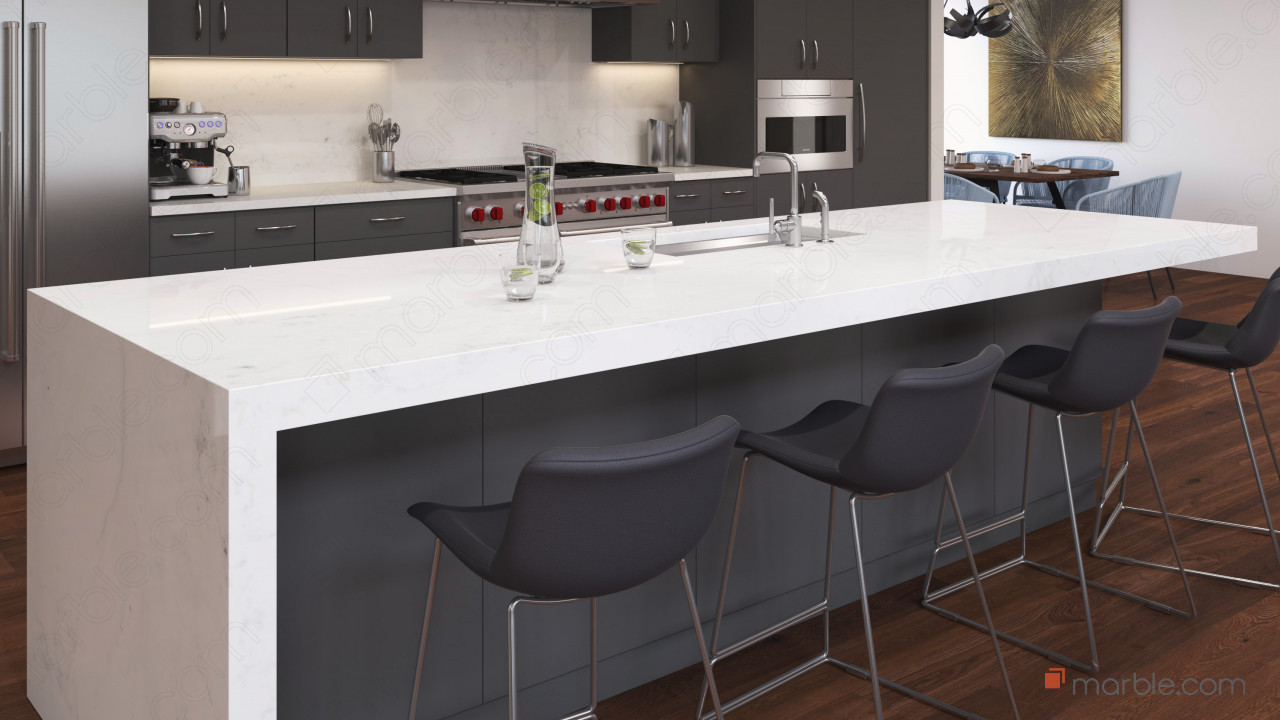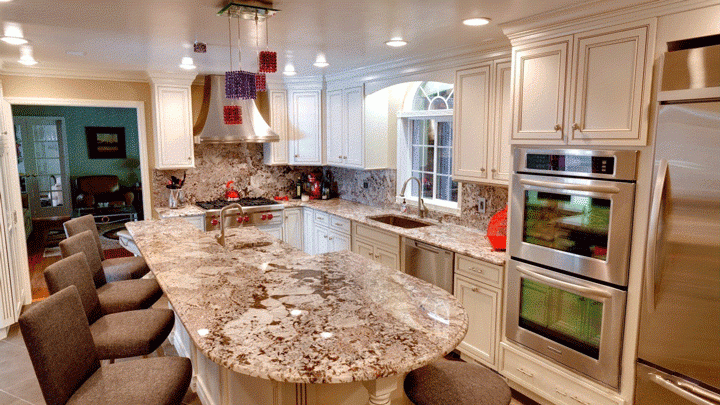Table of Contents

Marble is one of the most pristine and elegant stones you can use as your countertop. It has a rich history that goes back centuries, matches well with almost every interior design scheme, and tells your house guests that you have a top-quality stone countertop.
An important question when installing marble countertops if how thick do you want your countertops to be? Thickness is not often discussed regarding countertop material, but it is a big decision depending on how often you will be using that space. This is why we are going to highlight the different thickness levels of marble countertops and which one is the best fit for your home design.
Marble Thickness Sizes
Marble and other stone countertops are available in multiple sizes of thickness. For simplicity’s sake, we will keep all measurements simple by just having centimeters.
1 cm. Thickness
One centimeter of thickness is very thin and ill-advised by most fabricators. Countertops with this size are very easy to damage and requires additional support underneath so it does not break from constant use. It comes with laminated edge pieces to hide the seems of the plywood support underneath and give the illusion it is thicker than it actually is. One centimeter thickness marble is best used for large scale projects or as tile as a method to save costs.
2 cm. Thickness
Two-centimeter thickness is seen as the industry standard for countertop size. This thickness level has moderate strength and stability where it may or may not require plywood support; depending on how often the countertop will be in use. Two-centimeter thickness is an excellent option for countertops, vanity, and backsplash options.
3 cm. Thickness
Three-centimeter thickness is a little more expensive, but the optimal thickness level for countertops. At this level, the countertop has greater stability where it can handle constant active use and does not need regular plywood support. When getting marble countertops installed for an active kitchen, three centimeters should be the ideal range to install.
4+ cm. Thickness
Any thickness higher than four centimeters will be more expensive as it is going to be heavier and harder to install. Traditionally, owning very thick marble countertops is seen as s symbol of financial success and living in luxury. Designing your countertops with this level of thickness will provide an exceptional degree of protection and stability. However, it should only be used for countertop material, as incorporating it as a backsplash or wall tile will be too heavy with a lot of overhang.
[get_quote]
Thin vs. Thick Comparison
Having thin or thick countertops comes with its own strengths and weaknesses. By understanding their limitations, you can properly assess which thickness is right for your countertop.
Durability
Measure how strong the marble countertop can withstand active use and possible damage.
Thin: Thin marble countertops are less durable and more fragile. They can be easily damaged by extended use and could break or crack by supporting heavy objects.
Thick: Thick marble countertops are very durable and able to handle constant use while supporting heavy objects. Typically, the thicker the material makes it more resilient to damage.
Marble stone is very delicate and soft compared to other stones. Owning marble countertops requires homeowners to be careful working on it as it is prone to chipping or scratching when working directly on the surface.
Weight
Weight measures how heavy the marble countertop will be in reference to its thickness.
Thin: Thin marble countertops are very light weight. This benefits homeowners as it is very easy to move. However, thin marble countertops will require plywood support underneath it to reinforce the stone from bending or breaking. Thin countertops can extend out with an overhang easier, requiring less pillar reinforcements.
Thick: Depending on the size, thick marble countertops can range from moderate to very heavy. Moderate weight is still easy to move and work with, but heavy marble will be difficult to move and will require pillar reinforcements if an overhang is in the countertop design.
Cost
Depending on the size of the marble countertops, the price for purchase and installation will be affected.
Thin: Thin marble countertops are less expensive. It is more cost effective to buy in bulk with thin marble countertops. This is a great option for construction companies or hotels that need to fill many rooms at an affordable price.
Thick: Depending on the size, thicker marble countertops will be more expensive than the thin or medium sizes. Thick marble stone protrudes out more and does not work well for backsplash material or vertical decoration.
Installation
Cost and installation are closely tied together, as the more difficult marble is to install, the more it will cost you.
Thin: Thin marble countertops are easy to install and can save you a lot of money when purchased in bulk.
Thick: Thick marble countertops are more precarious to move and can cost more for installation.
Visual Appeal
Visual appeal is how aesthetically pleasing the marble countertops look to the homeowner and their guests.
Thin: Thin marble countertops are good for a minimalist, contemporary, or classic home design as they are simple and elegant.
Thick: Thick marble countertops are seen as more luxurious and expensive, making it more appealing to own.
[get_quote]
Choosing the Right Thickness
When deciding on the right thickness for marble countertops, take the following topics into consideration for your choice.
Active use
How often will this countertop be used?
What type of work will be done on this countertop?
Will this just be for visual appeal or continual use?
Visual Design
What room design are you trying to achieve?
Is there a specific look you want with this marble countertop?
What do you want your guests to think when they see your countertops?
What do you want to feel when using your countertop?
Budget
What is your budget for your countertops?
How much are you willing to spend on your countertops?
How much can you afford to spend on your countertops?
Seek Advice
Talk to experts on what they think would be the best option for your kitchen.
Conclusion
Choosing the right thickness is an important factor when installing marble countertops. Understanding the strengths and weaknesses of each size is imperative to make sure your countertop is designed appropriately so it can last you a lifetime.
















 The article helped me immensely
The article helped me immensely
 I’m now more informed on the subject
I’m now more informed on the subject
 I have questions about Marble.com
I have questions about Marble.com
 The article was not accurate at all
The article was not accurate at all
 There is a serious lack of information
There is a serious lack of information
 I have questions about Marble.com
I have questions about Marble.com